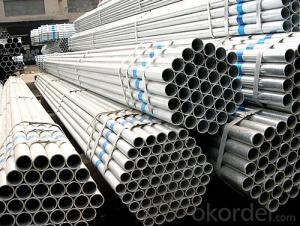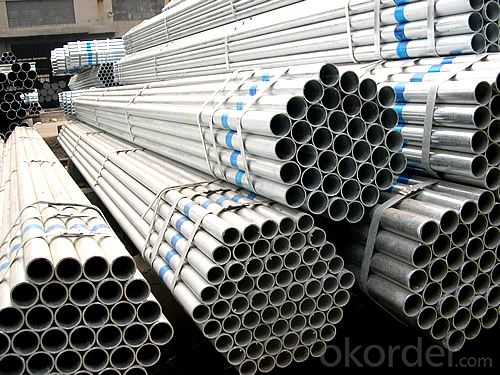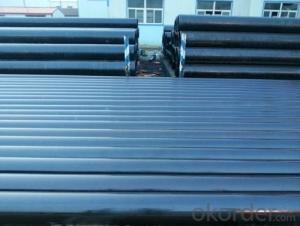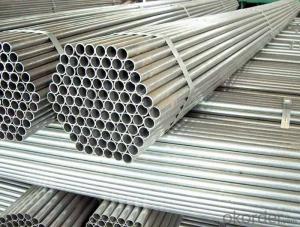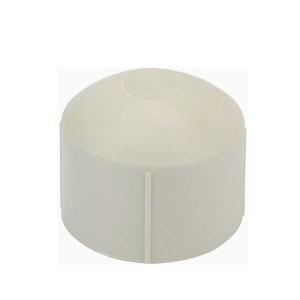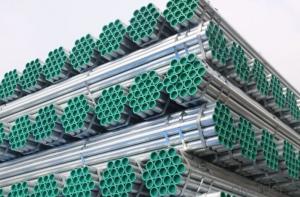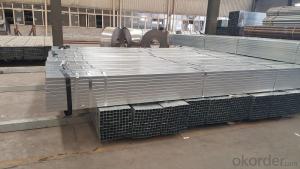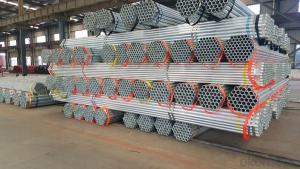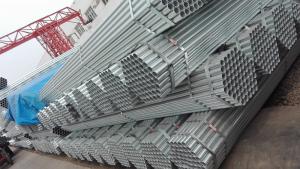Galvanized Welded Steel Tubes And Pipes High Quality
- Loading Port:
- China Main Port
- Payment Terms:
- TT or LC
- Min Order Qty:
- 25 m.t.
- Supply Capability:
- 8000-10000 m.t./month
OKorder Service Pledge
OKorder Financial Service
You Might Also Like
1、Structure of High Quality Galvanized Welded Steel Tubes And Pipes:
Seamless pipe is formed by drawing a solid billet over a piercing rod to create the hollow shell. As the manufacturing process does not include any welding, seamless pipes are perceived to be stronger and more reliable. Historically seamless pipe was regarded as withstanding pressure better than other types, and was often more easily available than welded pipe.
2、Main Features of the High Quality Galvanized Welded Steel Tubes And Pipes:
• High manufacturing accuracy
• High strength
• Small inertia resistance
• Strong heat dissipation ability
• Good visual effect
• Reasonable price
3、High Quality Galvanized Welded Steel Tubes And Pipes Specification:
Standard | GB, DIN, ASTM ASTM A106-2006, ASTM A53-2007 |
Grade | 10#-45#, 16Mn 10#, 20#, 45#, 16Mn |
Thickness | 8 - 33 mm |
Section Shape | Round |
Outer Diameter | 133 - 219 mm |
Place of Origin | Shandong, China (Mainland) |
Secondary Or Not | Non-secondary |
Application | Hydraulic Pipe |
Technique | Cold Drawn |
Certification | API |
Surface Treatment | factory state or painted black |
Special Pipe | API Pipe |
Alloy Or Not | Non-alloy |
Length | 5-12M |
Outer Diameter | 21.3-610mm |
Grade | 20#, 45#, Q345, API J55, API K55, API L80, API N80, API P110, A53B |
Standard | ASME, ASTM |
1) Material:20#(ASTM A 106/A53 GRB.API5LGRB,GB),45#,16Mn,10#.
2) Specification range:OD:21.3-610mm,WT:6-70mm,length:6-12m or according to the requirement of clients.
3) Excutive standards:GB,ASME API5L.ASTM A 106/A53,Despite of the above standards,we can also supply seamless steel pipe with standard of DIN,JIS,and so on,and also develop new products according to the requirements of our clients!
4) Surface:black lacquered,varnish coating or galvanized.
5) Ends:Beveled or square cut,plastic capped,painted.
6) Packing:bundles wrapped with strong steel strip,seaworthy packing.
4、Packaging & Delivery
Packaging Details: | seaworthy package,bundles wrapped with strong steel strip |
Delivery Detail: | 15-30days after received 30%TT |
5、FAQ of High Quality Galvanized Welded Steel Tubes And Pipes:
①How is the quality of your products?
Our products are manufactured strictly according to national and internaional standard, and we take a test
on every pipe before delivered out. If you want see our quality certifications and all kinds of testing report, please just ask us for it.
Guaranteed: If products’ quality don’t accord to discription as we give or the promise before you place order, we promise 100% refund.
②How about price?
Yes, we are factory and be able to give you lowest price below market one, and we have a policy that “ for saving time and absolutely honest business attitude, we quote as lowest as possible for any customer, and discount can be given according to quantity”,if you like bargain and factory price is not low enough as you think, just don’t waste your time.Please trust the quotation we would give you, it is professional one.
③Why should you chose us?
Chose happens because of quality, then price, We can give you both.Additionally, we can also offer professional products inquiry, products knowledge train(for agents), smooth goods delivery, exellent customer solution proposals.Our service formula: good quality+good price+good service=customer’s trust
SGS test is available, customer inspection before shipping is welcome, third party inspection is no problem.
6、High Quality Galvanized Welded Steel Tubes And Pipes Images
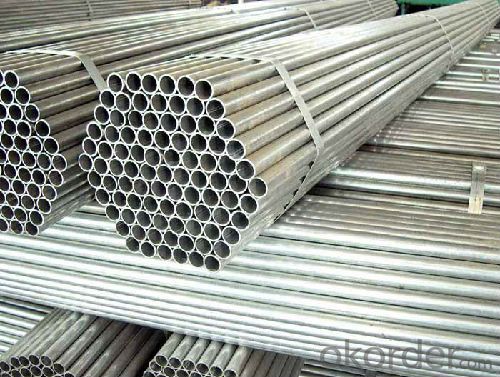
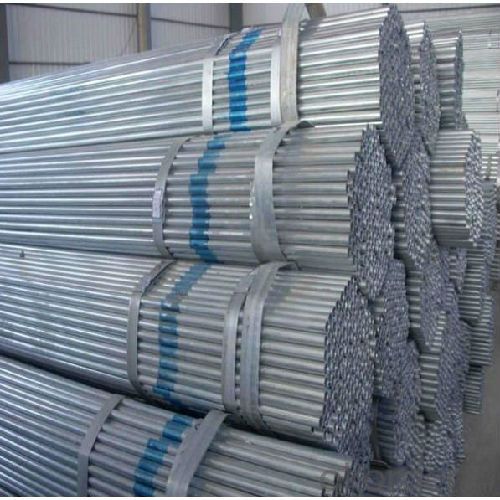
- Q: Can steel pipes be used for transporting sewage?
- Yes, steel pipes can be used for transporting sewage. Steel pipes are commonly used in sewage systems due to their durability, strength, and corrosion resistance, making them suitable for carrying wastewater and sewage over long distances.
- Q: What is the weight and strength of steel pipes?
- The weight and strength of steel pipes differ based on their dimensions and the specific steel grade utilized. Typically, the weight of steel pipes is measured in pounds per foot or kilograms per meter. The strength of steel pipes is commonly evaluated in terms of yield strength and ultimate tensile strength. The weight of steel pipes can range from a few pounds per foot for smaller sizes to several hundred pounds per foot for larger diameters and thicker walls. Various factors, including the pipe's outer diameter, wall thickness, and length, impact the weight. For example, a 1-inch diameter steel pipe with a wall thickness of 0.125 inches may weigh approximately 0.67 pounds per foot. Conversely, a 12-inch diameter steel pipe with a wall thickness of 0.5 inches can weigh roughly 142 pounds per foot. The strength of steel pipes is determined by the grade of steel used, which can vary depending on the specific application and requirements. Commonly used steel grades for pipes include ASTM A53 for general purposes, ASTM A106 for high-temperature service, and API 5L for oil and gas transportation. These grades possess different yield strengths and ultimate tensile strengths. Yield strength denotes the amount of stress a steel pipe can endure before it starts to deform plastically. It is usually measured in pounds per square inch (psi) or megapascals (MPa). For instance, ASTM A53 Grade B steel pipe has a minimum yield strength of 35,000 psi (240 MPa), while API 5L Grade X65 steel pipe has a minimum yield strength of 65,000 psi (448 MPa). On the other hand, ultimate tensile strength signifies the maximum stress a steel pipe can withstand before fracturing. It is also measured in psi or MPa. For example, ASTM A106 Grade B steel pipe has an ultimate tensile strength of 60,000 psi (415 MPa), whereas API 5L Grade X65 steel pipe has an ultimate tensile strength of 77,000 psi (531 MPa). In conclusion, the weight and strength of steel pipes can vary based on their dimensions and the grade of steel used. The weight is influenced by factors like the pipe's diameter, wall thickness, and length, while the strength is determined by the steel's yield strength and ultimate tensile strength.
- Q: How are steel pipes protected against external damage?
- Steel pipes are protected against external damage through various methods such as coatings, wraps, and cathodic protection. These protective measures help prevent corrosion, abrasion, and other forms of external damage, ensuring the durability and longevity of the pipes.
- Q: What are the different coatings applied to steel pipes?
- There are several different coatings that can be applied to steel pipes to enhance their corrosion resistance and durability. Some common coatings include epoxy coatings, polyethylene coatings, zinc coatings (galvanization), and polyurethane coatings. Each coating has its own specific benefits and is chosen based on the intended application and environmental conditions.
- Q: What is the process of coating steel pipes?
- The process of coating steel pipes involves several steps. First, the pipes are cleaned and prepared to remove any dirt, grease, or rust. Then, a primer is applied to the surface of the pipes to enhance adhesion. After the primer dries, a coating material such as epoxy, polyethylene, or zinc is applied using various methods like spraying, dipping, or wrapping. This coating material not only provides protection against corrosion but also acts as a barrier against external elements. Finally, the coated pipes are cured or dried to ensure the coating adheres properly and forms a durable layer, ready for use in various industries such as oil and gas, water supply, or construction.
- Q: What's the difference between hot-rolled seamless steel tube and cold-rolled seamless steel tube?
- Cold rolled seamless steel pipe (DIAL) in general, steel pipe for low and medium pressure boiler tube, high-pressure boiler steel pipe, alloy steel pipe, stainless steel pipe, oil cracking tube and other steel tube, including carbon thin-walled steel, alloy thin-walled steel, stainless steel, thin steel tube.
- Q: What are the different types of corrosion that can affect steel pipes?
- There are several types of corrosion that can affect steel pipes, including general or uniform corrosion, pitting corrosion, galvanic corrosion, crevice corrosion, and stress corrosion cracking.
- Q: Can steel pipes be used for petrochemical plants?
- Yes, steel pipes can be used for petrochemical plants. Steel pipes are commonly used in petrochemical plants due to their high strength, durability, and resistance to corrosion. They are suitable for transporting various chemicals, gases, and liquids involved in petrochemical processes. Additionally, steel pipes can withstand high pressures and temperatures, making them a reliable choice in the demanding environment of petrochemical plants.
- Q: How are steel pipes used in the manufacturing of furniture?
- Steel pipes are often used in the manufacturing of furniture as structural components. They are commonly employed for creating sturdy frames for chairs, tables, and other items. The pipes provide strength and durability, allowing furniture to withstand heavy loads and daily use. Additionally, steel pipes are often used for creating unique designs and modern aesthetics in furniture pieces.
- Q: Can steel pipes be used for paper mills?
- Yes, steel pipes can be used for paper mills. Steel pipes are often used in paper mills for various applications such as transporting water, steam, chemicals, and pulp. They are preferred for their durability, resistance to corrosion, and ability to handle high pressure and temperature conditions commonly found in paper mill operations.
Send your message to us
Galvanized Welded Steel Tubes And Pipes High Quality
- Loading Port:
- China Main Port
- Payment Terms:
- TT or LC
- Min Order Qty:
- 25 m.t.
- Supply Capability:
- 8000-10000 m.t./month
OKorder Service Pledge
OKorder Financial Service
Similar products
Hot products
Hot Searches
Related keywords
